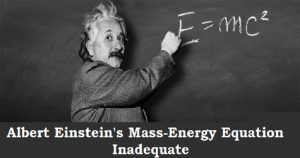
Indian Scientist’s Take On Albert Einstein, Claims Einstein’s Mass-Energy Equation Inadequate
Albert Einstein’s mass-energy equation (E=mc2) is inadequate as it has not been completely studied and is only valid under special conditions, an Indian researcher has claimed in an international paper. Mr. Ajay Sharma, an assistant director for education with the Himachal Pradesh government, has claimed that the genius’ mass-energy equation hasn’t been completely studied under all circumstances and it is inadequate.

Prior to Einstein’s theory of special relativity, mass and energy were considered different entities. In 1905, German-born physicist Albert Einstein proposed that both are inter-convertible and energy is released in this process. He then proposed the world renowned equation E=mc2.
In his research paper, Mr. Sharma who challenged Albert Einstein’s derivation of mass-energy equation says that the equation has been studied only under special conditions of the parameters involved, e.g. number of light waves, magnitude of light energy, angles at which waves are emitted and relative velocity v. Einstein considered just two light waves of equal energy emitted in opposite directions with uniform relative velocity.
“There are numerous possibilities for the parameters which аre not considered in Einstein’s derivation ∆E=∆mc2 is obtained from ∆L=∆mc2 by simply replacing L by E (all energy) without derivation,” he writes.
The equation proposes that increase in the relativistic mass of a body comes from the kinetic energy of the body divided by the square of the speed of light i.e. ∆m= E/c2.
Einstein simply arrived at E=mc2 from L=mc2 by replacing L by E (all energy) without derivation. “It’s illogical,” Sharma said.
His paper further mentions that W.L. Fadner correctly pointed out this flaw as Einstein did not mention E in the derivation.

Interestingly, Mr. Sharma’s book, ‘Beyond Einstein and E=mc2’ published by the Cambridge International Science Publishers, says Einstein was not the original propounder of the theory of relativity — he ripped off the existing work of Galileo (1632, Principle of Relativity), Poincare (1898, Constancy of Velocity of Light), Lorentz (1892, Variation of Mass etc), Larmer (1897, Time Dilation), and Fitzegerald (1889, Length Contraction).
“Many people will be surprised that Einstein’s work was not peer reviewed before publication. The first postulate of relativity was given by Galileo in 1632 in his book ‘Dialogue Concerning the Two Chief World Systems’,” the 51-year-old Sharma said.
Mr. Sharma’s technical paper — “The mathematical derivation or speculation of E=mc2, in Einstein’s September 1905 paper, and some peculiar experiments” — was published by Bauman Moscow State Technical University in Moscow last month. As mentioned above, he stresses on the fact that Einstein considered mass and energy the same physical entity that can be changed into each other.